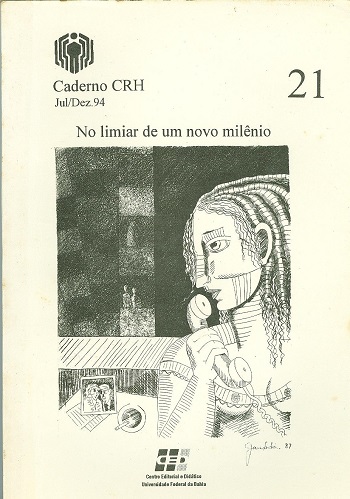Contra o Feitiço Patrimonial: A Alforria das Cidades
DOI:
https://doi.org/10.9771/ccrh.v7i21.18777Resumo
O texto mostra a necessidade de revisão dos paradigmas do desenvolvimento nacional e o que isto significa, tanto para repensar a idéia de poder local como para que as cidades ganhem uma nova visibilidade política na montagem das estratégias modernizadores. O autor sustenta sua tese em três argumentos: uma crítica ao desenvolvimentismo; resgata a importância da cidade ocidental como lugar privilegiado para compreensão das origens da modernidade; elabora algumas considerações sobre o significado e pertinência do conceito de cidadania cosmopolítica. Por fim, o autor coloca a necessidade de repensar a economia como instituição cultural, o que poderia ajudar a quebrar a magia positivista do fenômeno construído no imaginário da Sociedade Brasileira.Against patrimonial spell: the freedom of the cities
Paulo Henrique N. Martins
This paper is about the importance of reviewing national development patterns and their relevance for new ideas about local power and the role of the city's in new modernizing political strategies. Three main arguments are presented: firstly, a critique of the economic view of development which reduced the problem of crisis to that of economic and financial mismanagement, or to a unbalanced national economy; secondly, it reinstates the idea of the western city as the priviledged place where modernity originated and; thirdly, it suggests some considerations about the meaning and relevance of a broad cosmopolitan citizenry. Finally, it is argued that economics should be thought of as a cultural institution, which could open the way for a rupture in the positivist spell existing in the imagery of Brazilian society at large.
Publicação Online do Caderno CRH:
Downloads
Não há dados estatísticos.
Downloads
Publicado
2006-12-05
Como Citar
Martins, P. H. N. (2006). Contra o Feitiço Patrimonial: A Alforria das Cidades. Caderno CRH, 7(21). https://doi.org/10.9771/ccrh.v7i21.18777
Edição
Seção
Artigos
Licença
Todo o conteúdo da revista, exceto onde indicado de outra forma, é licenciado sob uma atribuição do tipo Creative Commons BY.
O periódico Caderno CRH on-line é aberto e gratuito.





